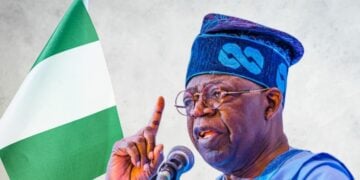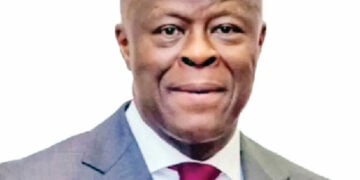We marked the World Consumer Rights Day penultimate weekend. I reflect on some of the seminal moments in recent history in which people demanded their rights. I remember the African anti-colonial movements of the 1950s, the US Civil Rights Movement of the 1960s, and the Arab Spring of the 2010s. Surely millions of people did not march — even at the risk of death — just to have their rights “acknowledged.”
They marched for what rights can do, i.e. enforce their freedom to live a dignified life. A dignified life requires access to basic decent experiences (such as a respectable home and community, reliable energy, mobility, education, connectivity, and healthcare). If a dignified life is central to our humanity, then access to credit — essential for many to activate such a life— should be considered a fundamental human right.
Now, let’s talk about Nigeria: a nation brimming with potential, yet shackled by a financial system that leaves most people out in the heat. The numbers don’t lie: only about 3% of Nigerian workers have accessed any formal consumer credit in the past year.
To achieve the “visible impact” of consumer credit seen in the BRICS countries, Nigeria’s consumer credit sector would need to reach 50% of our GDP — that is, a staggering ₦176 trillion. We are not close; the current gap stands at ₦141.3 trillion. Multiples of the required capital already circulate within Nigeria’s financial system — or could be mobilized with minimal effort — but consumer credit remains out of reach for millions. This is not due to a lack of funds, but rather because trust in the system is broken.
This is more than a policy problem — it is also a problem of innovation. As argued by Clay Christensen and his coauthors (Efosa Ojomo and Karen Dillon) in The Prosperity Paradox, true prosperity is not about pushing resources; it is about creating markets. It is about applying marketcreating innovation to make a product or service widely accessible to a large swath of previous nonconsumers, thereby growing the industry and — consequently — attracting (pulling) the right infrastructure, regulation, and ecosystems to accelerate and sustain it.
In our application of the prosperity model, credit plays two roles:
* First, credit is a product. Like any product, it needs marketcreating innovation to reach those who have been left out. A few innovations that come to mind include mobile nanoloans, instant credit decisions embedded at points of purchase (including in ecommerce), “buy now, pay later” options for basic goods, the simple digitisation of records from local savings groups to attract more loan capital, and tailored products for underserved groups (such as women and youth) designed specifically for their contexts.
These are not just loans; they’re lifelines. We must accelerate the work of our innovators solving these. Innovations are also critical in the securitisation of loans — for example, by developing alternative forms of collateral and improving collections infrastructure.
We should fully democratise the CBN’s movable collateral registry and global standing instruction (GSI) so that every kind of ethical lender can use it. We should also consider what additional assets people can pledge ethically — e.g. digital assets, agricultural output, perhaps even legally quantifiable labour — to engender more trust.
Second, credit is a marketcreating innovation in itself. It unlocks access to products and services across other industries, thereby converting millions of previous nonconsumers of those products.
It would fully democratise access to solar home systems, opening the door for a million firsttime consumers of constant, clean alternative energy.
It brings another million people into the digital economy as firsttime owners of laptops and smartphones through credit (our current smartphone penetration is less than 30%).
It is the antidote to transportation poverty, enabling millions others to purchase vehicles of all types. It facilitates access to improved or brandnew homes. And for each of these industries — solar, electronics, mobility, construction, furniture — the benefits multiply: industries thrive, and jobs are created.
This “dual efficacy of credit” makes it an incredibly powerful tool for selfactualisation and a dignified life. There is therefore no reason why consumer credit — on an individual level — should not be treated with the same gravity as a fundamental human right.
CREDICORP gets this. We’re not just pushing loans; we’re building an ecosystem. Our mandate is clear: to accelerate access to consumer credit for 50% of all working Nigerians by 2030.
We’re laserfocused on removing the structural, market, and policy barriers that hold Nigeria’s back from credit access.
Strengthening Nigeria’s credit infrastructure: We want to ensure that every economically active citizen has a dependable and allencompassing credit score. This score becomes personal equity, facilitating further access to consumer credit.
Offering wholesale capital and credit guarantees: We empower financial institutions to expand their reach.
Driving a cultural reorientation: We promote understanding of responsible consumer credit as a tool for growth and empowerment, making it less daunting for both consumers and lenders (including technical assistance for lenders).
Our growing impact and beneficiaries keep us going, on the journey to one million creditbacked consumers across a series of initiatives. Our model relies heavily on co-creating with our growing list of partners, including financial institutions, regulators, aggregators, innovators, and multilateral organisations — on a journey that is not just long but exciting.
On this World Consumer Rights Day, we re-subscribe to the rights to life, to liberty, and to self-actualisation. For most people in a modern economy, self-actualisation starts with credit.
– Nwagba, Managing Director/CEO of the Nigerian Consumer Credit Corporation (CREDICorp), writes from Abuja





